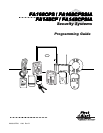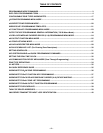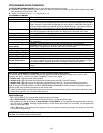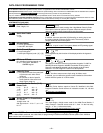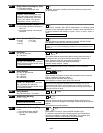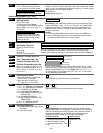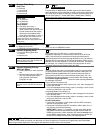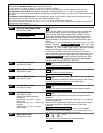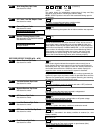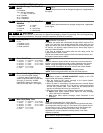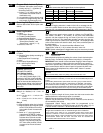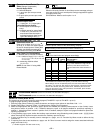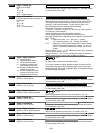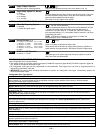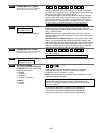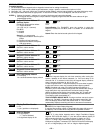
– 7 –
∗
∗∗
∗50
Burglary Dialer Delay
Delay Time:
0 = no delay
1 = 15 seconds
2 = 30 seconds
3 = 45 seconds
SIA-Compliant Controls:
Delay Time:
1 = 15 seconds
2 = 30 seconds
3 = 45 seconds
Delay Disable:
0 = use delay set in entry 1
1 = dial delay disabled for zones
listed in zone list 6 (use zone list 6
to enter those zones that require
dial delay to be disabled; these
zones ignore the setting in entry 1)
UL: Dial delay plus entry delay must not
exceed one minute; use zone list 6 to
disable dial delay from appropriate zones,
if necessary.
[2,0]
Delay SIA-Compliant Controls:
Time Delay Disable
Provides delay of “BURGLARY ALARM” report to the central station,
which allows time for the subscriber to avoid a false alarm transmission.
This delay does not apply to zone type 24 alarms (silent burglary) or to
24-hour zone types 6, 7, and 8 (silent panic, audible alarm, auxiliary
alarm), which are always sent as soon as they occur.
UL: Delay Time must be 0
SIA Guidelines: delay must be minimum of 15 seconds
∗
∗∗
∗53
SESCOA/Radionics Select
0 = Radionics (0-9, B-F)
1 = SESCOA (0-9 only reporting)
[0
Enter 0 for all non-SESCOA formats.
∗
∗∗
∗54
Dynamic Signaling Delay
0 = no delay (both signals sent)
1 = 15 secs
2 = 30 secs, etc.
UL: If using line security, must be 0.
Reports will be sent to both the dialer and
the communication device.
[0]
Select delay from 0 to 225 secs, in 15-sec increments.
Intended for reporting via a communication device on the ECP bus
(LRR). This field lets you select the time the panel should wait for
acknowledgment from the first reporting destination (see ∗55) before it
attempts to send a message to the second destination. Delays can be
selected from 0 to 225 seconds, in 15-second increments. This delay is
per message. If 0 is entered in this field, the control panel will send
redundant reports to both Primary Dialer and LRR.
∗
∗∗
∗55
Dynamic Signaling Priority /
AAV Path Select
0 = Primary Dialer first / AAV via phone
line
1 = Communication Device (LRR) first /
AAV via communication device
path (see AAV Path Select
paragraph at right)
For UL Commercial Burglary installations
that use a DACT and LRR, this field must
be 0.
[0]
This field selects the primary communication path for reporting (dialer
or communication device) of primary phone number events (see ∗49
Split/Dual Reporting) and selects the communication path used for
AAV sessions (phone line or communication device path). Use ∗29
IP/GSM menu mode to enable the communication device being used.
For Dynamic Signaling Priority:
Select the initial reporting destination
for messages as follows:
Primary Dialer First selected (
0
):
• If acknowledged before delay expires (see ∗54), then message will
not be sent via LRR.
• If not acknowledged before delay expires, message is sent to both
the Primary Phone No. and via LRR.
Long Range Radio First selected (
1
):
• If acknowledged before delay expires, then message will not be sent
to the primary dialer.
• If not acknowledged before delay expires, message is sent to both
the Primary Phone No. and via LRR.
For AAV Path Select:
• If using the UVS system or AVS system with non-ECP connection,
option 0 must always be used.
• If using the AVS system with ECP connection, either option (0 or 1)
may be used, but note the following:
IMPORTANT: If option “1” is selected, a 2-way voice (AAV) device
compatible with the communication device path must be used (ex.
GSMV communicator). When selected, AAV sessions always occur
via the GSMV communicator, even if reporting reverts to phone line
backup due to GSMV communicator path reporting failure.
∗
∗∗
∗56, ∗
∗∗
∗57, ∗
∗∗
∗58 Menu Modes
These are Menu Mode commands, not data fields, for Zone Programming, Function Key Programming, and Expert Mode
Zone Programming respectively. See page 3 and respective sections later in this document.



